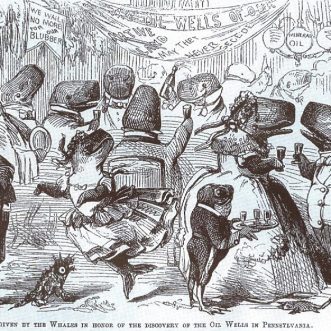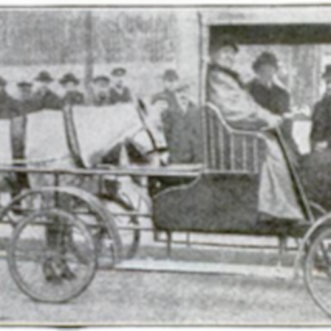
Category: Systems Thinking


Making payment part of the experience
It’s a cliché that small businesses like me don’t like to ask for payment. That we somehow feel guilty about asking to be paid for the value we deliver – perhaps because we don’t altogether believe in that value ourselves.
The upshot is that either we invoice late, even erratically, or we seek to make the payment aspect invisible to the client, by using a service like GoCardless for example.
But what if there was a better way?
What if you could make payment truly part of the customer experience? In the way it often is for retail.
What if you could use every invoice to remind your client of how far they’ve come on the journey they enrolled on with you? Of how much they’ve achieved as a result of working with you? Of all the ideas and actions you’ve generated together?
To enable them to relive all the reasons they chose you, and the benefits they’ve gained as a result?
That might be a far from unpleasant experience for the client.
Of course to keep invoicing, you’d have to keep delivering value.
But that’s not a bad discipline to put yourself under.
After all, Discipline makes Daring possible.

There is no such thing as Admin
If I ruled the world, there would be no such thing as admin.
No doing the job, and then recording that you’ve done the job.
No doing the job, then trying to remember how long it took you.
No working out how far you are through doing a job.
No going looking for the things I need to do the job. They would simply appear when I need them as a result of another job, done by me or someone else.
No raising invoices for a job done, days or even weeks after it was done. Getting paid is an intrinsic part of doing the job. It can also take place in parallel.
No starting a job without finishing it. Or at least leaving it in a clearly defined and safe state.
There would be reporting. It just wouldn’t be me doing it. Doing the job would produce this information as a side-effect. No need to create extra ‘work about work’ to do that.
There would be feedback too. From the system to me, that tells me where I am and how I’m doing. From other humans to me and from me to other humans about how we could make doing the job easier, faster, cheaper, more effective – for the benefit of the people we serve.
Let software do all the admin. Leave the difficult, unpredictable, interesting bits of doing the job to me please. I’m better at them than any machine.
My world is not so hard to achieve. It’s possible right now.
All you have to do is think differently about what a job is.
Discipline makes Daring possible.

Revisiting the past
Today seemed like a good day to revisit this blog post, inspired four and a half years ago, by Seth Godin:
“In the last fifty years, thanks to Deming and Crosby and others, we’ve gotten significantly better at creating perfect outputs that don’t rely on heroism and luck. Design a better system, you’ll get better outputs.
I’m grateful every day for the nearly invisible perfect things that I count on… but, and I feel spoiled to say this, I take the perfect for granted.
I’m way more interested, and spend far more time and money on the imperfect things, the things that might not work, the ideas and services and products that dance around the edges.”
I agree. Over time, the perfection of processes has freed ever more of us up to spend ever more time on the interesting, edgy things – telling stories instead of fetching water, making art instead of travelling for days on end, discovering new things instead of cooking, connecting with and trusting strangers instead of only dealing with people we already know.
But I also disagree with Seth’s implication that you can only have one or the other, perfect process or interesting edge, invisible clockwork or flesh and blood.
For me the fascinating challenge is to how to combine both.
How do you put enough process in place to make sure that what should be invisible stays invisible, without restricting the free exploration that discovers new edges?
How do you ensure that clockwork-like perfection supports and enables flesh and blood to dance around the edges, making things more human, more emotional, more daring?
If a process framework is like a musical score, how do you make it more jazz than classical?
I didn’t have a perfect answer, then, and I don’t now, but I am getting closer.
- It’s about defining a floor (even better, a springboard), ‘the least that should happen’, along with strict guardrails – your Unbreakable Promises, that constrain possible actions to what fits with your Promise of Value.
- It’s about defining ‘what’, not ‘how’.
- It’s about maps, not GPS tracking.
- It’s about embracing uncertainty for its potential upside, while making sure any downside won’t kill you.
- It’s about automating drudgery, to free humans to be human, and play.
Above all, its about giving human beings the context, the tools and the authority to think for themselves and take the consequences, good as well as bad.
It’s about freedom. Freedom that recognises every other’s right to the same.
Discipline makes Daring possible

Harmony
Harmony isn’t only everyone singing or playing the same tune at the same time, powerful as that kind of harmony is.
Harmony can also be an active fitting together of differences so that together they sound more than the sum of the parts.
The first kind of harmony is easy to take part in. Just sing or play along wth everyone else.
The second takes more effort, to hear what’s going on around you, keep time and co-ordinate your own music making accordingly. An active fitting together of differences to create a much richer sound experience.
You can teach people to make the first kind of harmony just by getting them to practice.
For the second, you need a score.
Which means you have to become a composer, not an instructor.
Discipline makes Daring possible
HT to Bettany Hughes for prompting this one.

There’s something about Muri
In Lean, ‘wasted effort’ is categorised 3 ways:
- ‘Muda’ – effort that does not add value for the customer.
- ‘Mura’ – wasted effort due to variation.
- ‘Muri’ – wasted effort due to overburdening or stressing people, equipment or systems.
Muda is the most talked about form of waste, sub-categorised into 7 further types:
- Transport – excess movement of product.
- Inventory – stocks of goods and raw materials.
- Motion – excess movement of machines or people.
- Waiting.
- Overproduction.
- Over-processing.
- Defects.
Mura is often a result of Muda, and the solution to many of these issues is to standardise processes and relocate resources so they are available ‘just in time’ when and where they are needed.
The problem with this of course, is that whether an activity is Muda depends on where you draw the line around the system. Biomass boilers are eco-efficient, as long as you don’t count the lorries trucking pellets around a country – a clear case of Transport Muda when you look at the bigger system.
What I want to think about today though, is Muri. Wasted effort due to overburdening or stressing the people, equipment or system.
There’s something about Muri that makes it the Cinderella of Lean.
It isn’t glamourous, fixing it doesn’t attract the kind of kudos Muda does. Perhaps it’s just harder to measure.
Whatever the reason it gets left to pick up all the dirty work.
Muri is often caused by too much attention to Muda. Redundancies are stripped out the system, leaving no room for slack. Everything is expected to run at 100% capacity all of the time. People are expected to do more with less, both at work and at home.
The result?
Look around you and what I think you’ll see everywhere a massive case of Muri. People and systems – including our planetary system – stressed and overburdened to breaking point.
As a small business owner, you can’t fix it all. But you can fix it in your business.
What if you let people work a 4-day week? or a 13-day fortnight? Or take a 2 hour lunch break?
What if you put together a flexible plan of working hours for the year that accounted for busy times and quiet times?
What if you set the example yourself by working only your official hours, having your weekend and taking a couple of weeks off every now and then?
You could do all of this, even in a service business, by paying a little attention to Muda and Muri (but not too much):
Start by writing down your Customer Experience Score , so that everyone can play it consistently.
- Automate the parts that are drudgery for humans.
- Leave room for variations that will delight the customer.
- Then give people the responsibility and autonomy to get on with it, at a sensible level of capacity.
You’ll all work less hard for greater rewards.
Discipline makes Daring possible.

Hiding in plain sight
Orange Oakleaf Butterflies confuse their predators on purpose, hiding in plain sight.
In the dry season, they pretend to be a dried out dead leaf. In the rainy season they pretend to be a damp dead leaf. The birds, ants, spiders and wasps that eat them, already have a mental model of what a dead leaf is. That model doesn’t include being edible. So they ignore this leaf and carry on looking for their next meal.
We humans are the apex predator par-excellence. We don’t have to pretend to be anything other than we are to survive.
Still, we confuse other people all the time. Sometimes on purpose, most often by accident. Because we constantly assume that our mental models are the same as everyone else’s. We think everyone knows what we know, believes what we believe and wants what we want.
Take a small business:
For a shareholder or investor it’s a machine for generating dividends on their capital.
For founders it’s a way to make their unique dent in the universe.
For their accountant it’s a set of connected accounts that need to balance.
For their operations manager it’s a set of loosely related functions, one of which they probably consider to be more important than the others.
For some employees it’s simply a means to enjoy life outside work. For others it’s means to survive. For others still, play.
For customers it’s a solution to a problem, a status enhancer, a community they value or a purpose they believe in.
All these different mental models can pull a business in different directions, leading to confusion.
And as we know, a confused mind says ‘no’.
The answer is to get clear about what your business is here to do as soon as you can, and to present that as an explicit model everywhere.
Choose a model that is simple, easy to communicate and effective in delivering what everyone wants.
Design your business around that model, so that the way it works clearly reflects the concept behind it.
Share that model in your marketing materials, shareholder reports, filed accounts, operations manual, help guides and status reports, so that it becomes utterly familiar, whatever your role or relationship to the business.
That way, nobody’s confused.
Some may not like it, but they will leave you alone. The ones that do like it will be more than happy to help you bring it to life.
If you’re a small business employer, looking for a model to adopt, you’ll be pleased to know that you already have one, hiding in plain sight.
And I can help you reveal it.
Discipline makes Daring possible.

Repeating ourselves
It looks as though humanity (actually only a small part of it) is about to repeat one of our gravest and most frequent mistakes – to start exploiting a vast and almost completely unknown resource without thinking seriously about the possible consequences. In pursuit of materials that may well prove to be redundant in a few years.
We did it with whale oils, we did it with America’s great plains, we’re still doing it with rainforests and wetlands everywhere, and now we plan to do it with the mid-ocean ridges.
What makes it worse, is that the benefits will accrue to a few, while the harms will accrue to many, for generations to come. We won’t even recycle the materials we extract – why bother when it’s cheaper to mine, for as long as the true cost is never accounted for?
It’s not quite too late to stop this, Greenpeace has a petition you can sign, but maybe the best thing is simply to make yourself and others aware, so they can sign too.
We humans are ingenious creatures, we don’t have to go on repeating ourselves.
We could force ourselves to think of better alternatives by making promises to our planet and our future selves.
Discipline makes Daring possible.

This is gold
“There is literally no limit to the promises we can make. The only limit is to the number we are able to fulfill.”* Richard Murphy
So, if you have some energy, capability or capacity going to waste in your enterprise, get making some new promises.
Otherwise, concentrate on fulfilling the promises you’ve already made, and get building your energy, capacity and capabilities.
And if you can’t do that quickly enough, put your prices up temporarily to slow down demand while you build.
*The quote is about money of course, which is simply a promise to pay. A country like the UK, that issues its own currency, can make as many of these promises as it likes, as long as they can be delivered. It’s what Maynard Keynes meant when he said “What we can do, we can pay for.”

What if you could do things the other way around?
Clothing brand Unfolded only makes what they have already sold.
More than that, they only make what they know people will buy. They find out what to make by getting their customers to help with the design process every couple of months.
A very simple way to save waste of all kinds.
Where could you put the cart before the horse in your business?
Discipline makes Daring possible.
One of the first things a professional de-clutterer will do is get rid of ‘duplicates’.
This is a strictly utilitarian view, that says one cake-slice is much like another, and ignores all the possible reasons why you might end up with 10 of them.
You might have received one as a gift, or inherited one from a parent or friend. You might have had to rush out and buy new because you couldn’t put your hand on one just when you needed it. You might have just liked the look of it.
Or you might simply be satisfying that very human urge for repetition with variation that encourages us to build collections.
All that makes choosing ‘the one’ that’s going to stay, emotional and just a bit stressful, especially if you’re made to feel judged by your inability to maintain a minimal lifestyle.
Which might be one reason I dislike de-cluttering TV programmes so much.
As you grow your small business, working out what your clients really want, and finding new ways to delight them, you acquire business processes like I acquire cake-slices.
You inherit them from your previous workplace, or maybe even the previous owner. A new employee gifts you a shiny new one. You cobble a new one together in a rush, because you can’t quite put your hand on the one you did earlier when you need it.
Or, as happens when we’re in the thick of it, it’s simply easier to focus on the differences between cases rather than the similarities.
Luckily, business processes aren’t like cake slices. We don’t have to choose.
We can combine the best features of all of them to create one beautiful and super-useful process, with all the emotion built in, and still with room enough to deal with a new kind of cake.
That means that when I work with clients, I can start by assuming we’re going to keep everything, and work on capturing and streamlining the most salient version – the one that happens most, or is the most difficult to hand over, or the most complicated.
Usually, by the time we’ve worked through that, the owner has realised that they don’t need all the others. This new process covers all the options.
We check to make sure of course. And if, on further inspection, it turns out we do need another version, we put that in place, reusing as much of the newly designed process as we can.
No stress. No agonising over what to keep and what to throw away. No being made to feel like you are in the wrong.
Just the relief of knowing that all that clutter is now out of your head, and out of the business too. Making it a calmer, clearer place to work for everyone, with added room for innovation.
Discipline makes Daring possible.
I’m Kirsten Gibbs, Boss Disappearer, and I can help you write your Customer Experience Score , to make your business easier to run, easier to grow and easier to build into a legacy you’ll be proud of.
Ask me how.